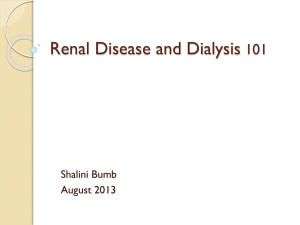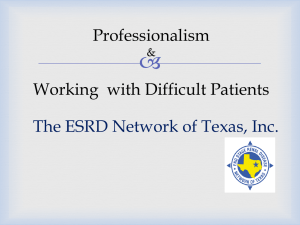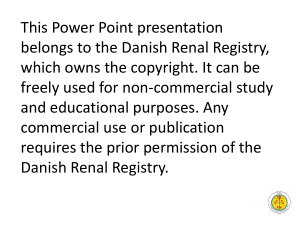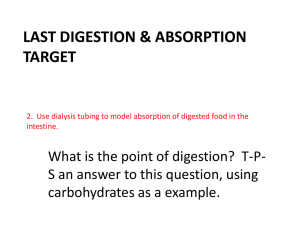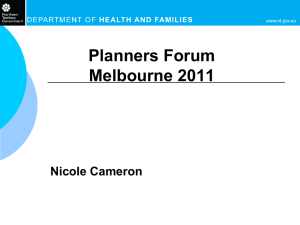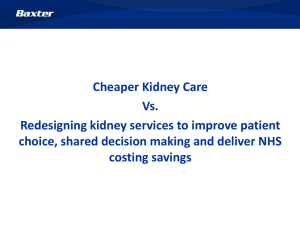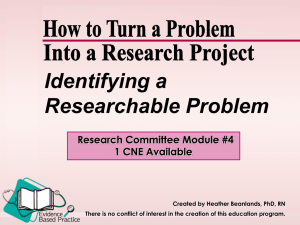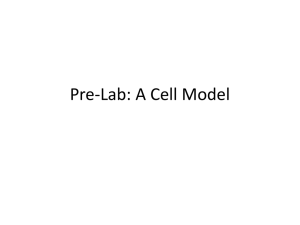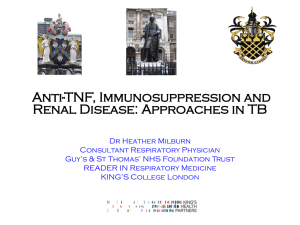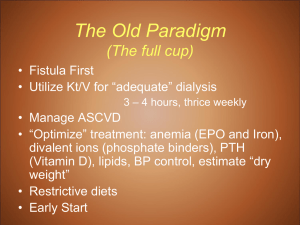Intern Boot Camp: Dialysis
advertisement
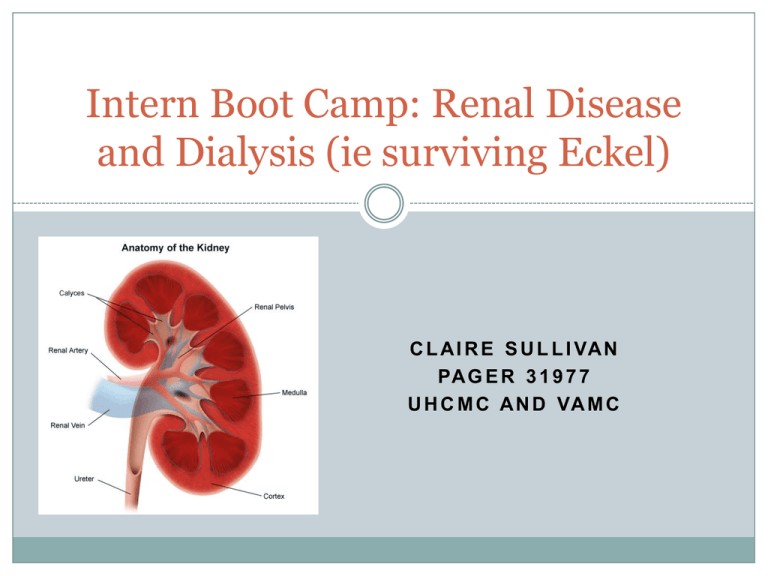
Intern Boot Camp: Renal Disease and Dialysis (ie surviving Eckel) C L A I R E S U L L I VA N PA G E R 3 1 9 7 7 U H C M C A N D VA M C At the end of the talk, you will understand this: Just kidding!!! Don’t worry, now on to the basics… Objectives Definitions Types of Dialysis Access Acute indications for dialysis How to present a dialysis patient Eckel helpful hints What you might get called about on Nightfloat Definitions Stages of Chronic Kidney Disease (CKD) Leading causes of End Stage Renal Disease (ESRD)? DM, HTN Definitions Renal Replacement Therapy (RRT) includes: 1. Hemodialysis (HD) 2. Ultrafiltration (UF) 3. Continuous Veno-Venous Hemofiltration (CVVH) 4. Peritoneal Dialysis 5. Renal transplant Types of Dialysis Hemodialysis (HD): extracorporeal removal of waste products (urea, creatinine) and free water from the blood across semipermeable membrane Types of Dialysis Ultrafiltration (UF): -Way to remove extra fluid volume -Just know term exists CVVH: -Used mainly in ICU for patients who can’t tolerate intermittent dialysis -Less drastic fluid shifts and hypotension -Runs for 24 hours a day -Done through temporary catheter Types of Dialysis Peritoneal Dialysis (PD): patient’s peritoneal membrane is dialyzer; can be done at home. Access Fistula: Best choice since directly connects native artery to vein Can take up to 6 months to mature. Made by Vascular Surgery Graft: Synthetic tubing connects artery to vein Second best choice Also by Vascular Surgery More complications such as thrombosis, outlet obstructions, aneurysms Access Catheters: Can be tunneled or temporary Usually into right internal jugular vein Indications for Dialysis A (acidosis) E (electrolytes like high K) I (ingestions) O (overload) U (uremia) How to Present a Patient on Eckel Mr. S is a 75 yo M with hx of ESRD 2/2 DM on HD MWF at CDC East via RUE AVF with nephrologist Dr. Wish who presents with… Also, know patient’s dry weight (kg) and vintage. So you are admitting a patient on Eckel… Always ask about details of the last dialysis session: when, was it a full session, did patient get any meds (antibiotics, epogen, etc.) during dialysis, blood draws You can get run sheets from dialysis center by calling. Very helpful with vitals, meds administered, blood cultures. Eckel Helpful Hints Remember renal dosing of medications. Antibiotics are usually loading dose then post-dialysis doses (vanc 20 mg/kg then 500 mg after dialysis ). Dialysis techs can draw labs and cultures for you during session Dialysis is located on Lakeside 20 and VA 2nd floor (2B-100) If patient is anemic, it is better to give blood with HD Don’t check blood pressure in access arm More Eckel Helpful Hints Never give ESRD patients the following medications: Morphine Fleet’s enema Gadolinium (MRI) Maalox For patients needing temporary access: computer order body angio and free text what you need (temporary right IJ catheter, for example). Also, call down to angiography. Patient needs to have set of recent coags since angio prefers INR < 1.2. Common Eckel Admissions SOB/Fluid overload (usually from missed dialysis session) Hyperkalemia (usually from missed dialysis session) Line infections Access issues Hypotension (too much fluid taken off at dialysis) Hypertensive crisis (usually from missed dialysis session) You are the Eckel Nightfloat Intern LK 50 nurse calls and says “Mr. T (who has stage IV CKD) is having difficulty breathing. He is currently satting 88% on RA.” What else do you want to know from the nurse right away on the phone? What do you ask the nurse to do as you walk all the way over to Lakeside from Tower 5? What tests or imaging do you want? How do you treat SOB in CKD patients? See the patient and write an event note. You are the Eckel Nightfloat Intern You are the Eckel Nightfloat Intern Hyperkalemia First, make sure sample not hemolyzed Diet? New meds? Missed dialysis? Treat with insulin, glucose, calcium gluconate, kayexalate, dialysis, bicarbonate, beta agonists (theoretically) You are the Eckel Nightfloat Intern Odessa pages you and says “Ms. M’s nurse wants to let you know that the patient has a temp to 39oC.” After you put down your Einstein bagel and go see the patient, you notice tenderness and erythema around temporary IJ catheter. Now what? What’s a line holiday? Blood cultures growing Staph. Knee-jerk test to order?? You are the Eckel Intern Nurse pops into the team room to say that Ms. B just got back from dialysis and BP is running low in 70s systolic. What else do you want to know? Causes of hypotension? How do you treat hypotension after dialysis in ESRD patients? You are the Eckel Intern Toni calls you with admission to Eckel for patient whose AV graft has not been functioning properly at dialysis. Important parts of physical exam? What imaging might be useful? Who do you call about access issues? You are the Eckel Nightfloat Intern It is 3 am and nurse calls to tell you that Mr. W’s blood pressure is 190/100. He is going to dialysis first shift in the morning. Do you treat his blood pressure acutely? How? ED had checked a troponin on patient, even though he didn’t complain of chest pain. Critical value of 0.1 called to you on NF. Now what? You are the Eckel Intern Lk 50 nurse text pages that Mr. G’s labs drawn immediately after dialysis reveal hypokalemia to 3.1. What do you do? Do you replete potassium? If so, how much? Important Numbers (thanks Hiloni) Melissa –HD/Vascular access coordinator who often rounds with you on Eckel Ext: 41219 Pager: 33968 Peritoneal Dialysis RN Ext: 48305 or 45703 Dialysis Units UH: 41586 VA: 5181 QUESTIONS?
